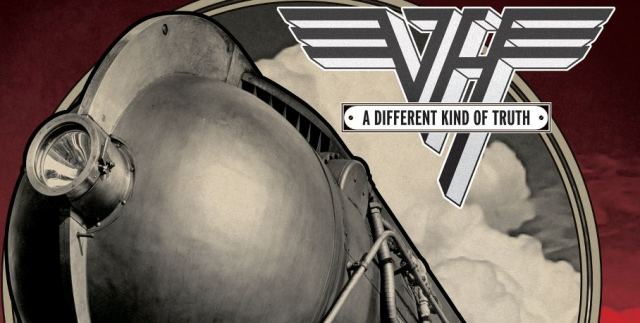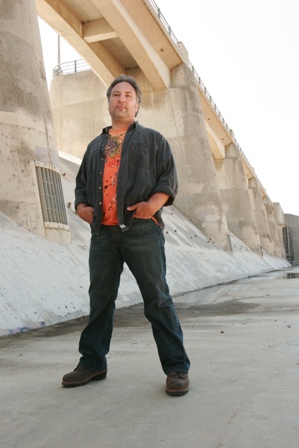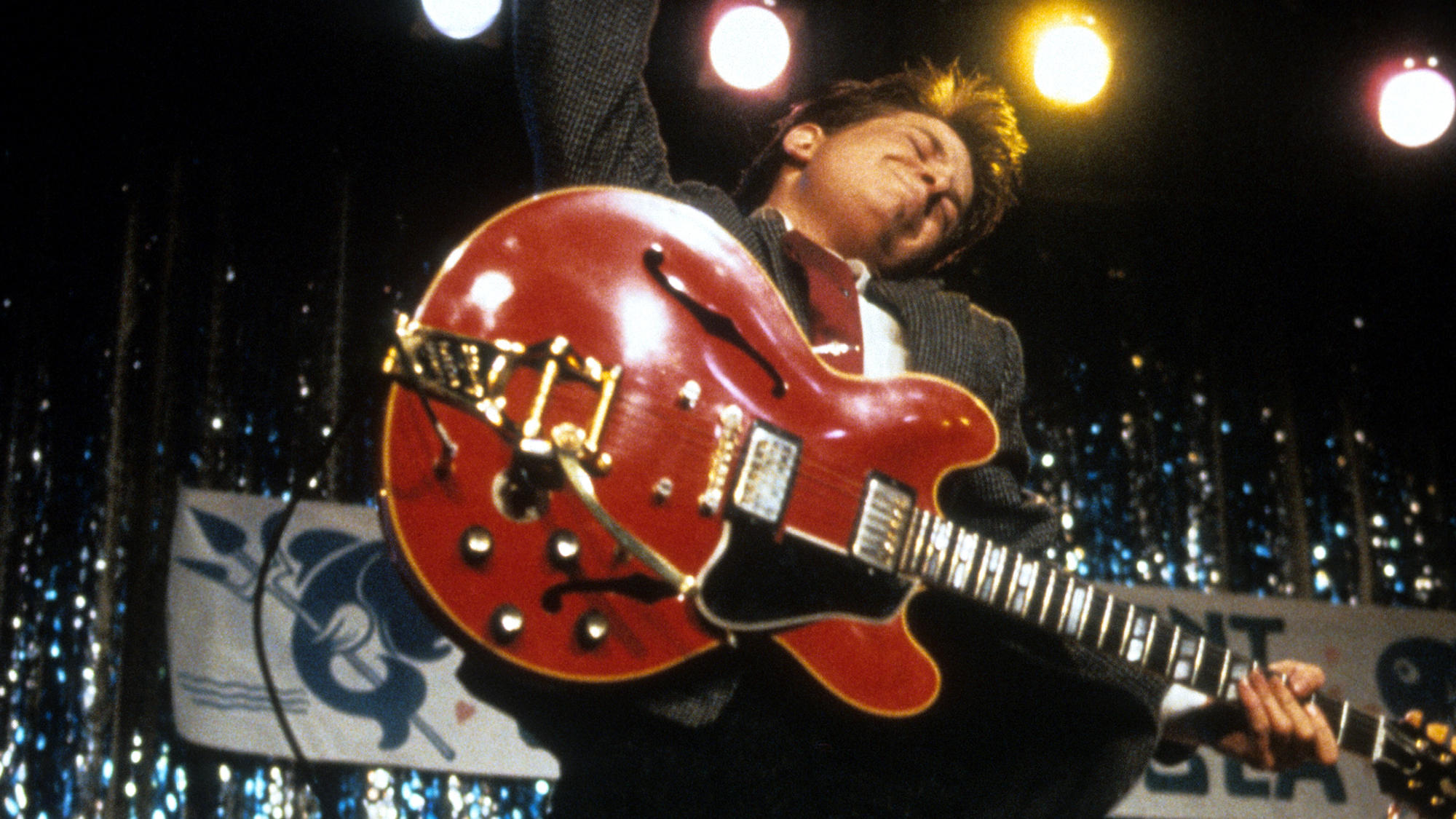Interview: Ross Hogarth Discusses Mixing Van Halen's 'A Different Kind Of Truth'

Ross Hogarth played an integral part in the recording of Van Halen’s A Different Kind Of Truth. His expertise, coupled with an innate understanding of studio dynamics, helped to create the long-awaited album.
A native New Yorker, Hogarth grew up surrounded by music and art and developed an interest in stringed instruments early on. He played guitar in punk bands during his high school years; following graduation, he relocated to the West Coast, where he became a guitar tech on the road with David Lindley, Mick Fleetwood, Christine McVie, Bonnie Raitt and Ry Cooder, to name a few.
Hogarth literally traveled the world as a roadie, then returned to Los Angeles and began his studio career. Over the past three decades he has produced and engineered a diverse roster of artists, from Motley Crue to Jewel, and has won two Grammy Awards: for Keb’ Mo’s Slow Down and Ziggy Marley’s Love is My Religion.
In this interview, Hogarth offers insight about the making of A Different Kind Of Truth and his role in the process.
GUITAR WORLD: At what point did you begin to understand the terms producer and engineer? You looked at album credits when you were young. When did you understand what those terms meant?
My father, Burne Hogarth, is one of the greatest cartoonists and illustrators of the last century, and being raised by him taught me many lessons. Very early on, I was fortunate to be brought up where the rubber meets the road in the art world, so I understood the difference between the person who made the art and the person who was the agent for the art. You correlate that to music, because music and art in the New York scene were all tied in. I was in and out of different studio situations in New York at a young age and I saw for myself before I truly had the depth of understanding what I saw. I had a really good sense of what George Martin was adding to the Beatles.
For all of us of the Beatles’ generation, we realized that without George Martin, you wouldn’t have had that next layer of the Beatles, and the same for a lot of records that I was into. If you followed George Martin, you realized that he also did Jeff Beck’s Blow By Blow, which was one of my favorite records ever — one of the most influential records I ever had in my life. Stevie Wonder has always been one of my favorites; he’s my desert island musician along with Jeff Beck. I knew that Stevie played all the instruments on most of his records, and you could hear it in the production when he didn’t, like when you listen to Songs in the Key of Life and you’ve got a band playing with him, it’s a whole different style of drumming.
All the latest guitar news, interviews, lessons, reviews, deals and more, direct to your inbox!

I got into all that detail very early on. It was a mixture of reading the credits and ear training. It was instinctual. I think I was in the music business before I had the chance to even decide what I was in. I knew early on that a producer is someone who does whatever it takes to help make the records.
I knew all about Jimmy Miller and the Rolling Stones. He would go out and play percussion with the Stones in the room to keep the groove together and be part of the room. His shakers and tambourines and percussion are all over the records that he made with them and the other bands he worked with, like Traffic. I was looking at those album covers and doing my homework.
What do the terms producer and engineer mean to you?
If I don’t make a discernible difference to the song or the arrangement of the song, if all I’m doing is capturing the sonics of the record, I really don’t believe I deserve a production credit. I think that’s overstepping the bounds of a producer and diluting the power of a producer. I believe that producers help write songs or arrange music and coax performances out of artists.
That’s where you cross over the line as an engineer, where if you’re working on a record without a specific producer, or the artist is self-producing, a lot of times the engineer becomes a co-producer because they are involved with the songs and the music just by virtue of being in the room. If the engineer doesn’t have a viable, credible musical bone in his body and he’s strictly a knob-turning guy who gets good sounds, then he doesn’t deserve production. If he’s a musical entity who can say, “You need to play that again because I know you’ve got better in you,” or “That riff you played — why don’t we restate that twice,” and there’s no producer in the room, then you are co-producing, so it’s a fine line sometimes. But if you’re just there for the sonics and not to make any creative decisions at all, you’re an engineer.
I am a producer. I just don’t produce everything I make. There are producers who never engineer, there are musicians who produce, and there are engineers who produce and will never engineer another record unless they’re producing. I’m not that guy. I’m often brought in as a sonic merchant to make sure that from a sonic platform and sonic level, this record is compatible and competes in the real world. When I came into the Van Halen world, I came in originally as an engineer. I don’t think they knew what I could bring to the table exactly until I got into it and started working with them on certain details of their sound, and I think they appreciated it because I love the art of that part of what I do.
How did you become involved with A Different Kind Of Truth?
Eddie, Alex and Wolfgang were working on music at 5150 in early 2010 and they needed somebody. When we connected in 2010, there were a few things in my favor. The first was that I’m a veteran and I’m flexible. I’ve been in and out of many different diverse situations. I went to 5150 and started working with them. I got along with the guys because I was, “What do you need me to do?” You can throw me in a studio like 5150 and I can figure it out in an hour. I went up there and immediately got involved with them, started moving forward and created a relationship built in the now — what needs to happen now. I jumped into where they were. They were going through the library of all the songs that they were going to eventually put on the record. We were just recording songs. Part of it was like rehearsing, too — recording, rehearsals, everything — so that they were not only honing and fine-tuning themselves as a band, but they were also working up the songs that they would eventually make the record with.
This was your first time working at 5150. What was the experience like for you?
It goes back to assessing situations. My studio, Boogie Motel, is mainly a mixing room, so I always have to go outside of my studio to record bands. There’s such a historical value to where the band has been making records for onward of 30 years, and you’re in someone’s comfort zone. I know there are all kinds of producer methods for getting bands out of comfort zones, but when someone invites you into their world, it’s like telling a chef to cook somewhere else.
The very least of what I do is fulfill the function of why I was brought there. A day or two in, you think you can upgrade something or offer possibility. I’m not too shy, that’s not my personality, and part of what I am is someone who offers an opinion. You come into a situation, assess it and move forward. I’ve been working as the sole engineer in many famous artists’ private studios for the bulk of my career, so I understood the opportunity to work in Ed’s studio was awesome and a privilege.
As the work progressed and the songs came together, at what point did you realize that this was going to be the album that Van Halen fans had been waiting for?
The first hour. The first ten minutes I heard them playing, I was so blown away that it was like, “Oh my god, Van Halen is back! Or maybe they never left!” But man, the first five minutes, my thought process was, If this ever sees the light of day, people are going to be blown away. This is “Oh my god!” And I’ve got to tell you: maybe this is something they sensed in me, too — I have been there. I’m not saying this like some kind of cocky bullshit. I’ve been there, done that.
No, I hadn’t made a record with Van Halen yet, but I’ve worked with most of my heroes, and some of them at a very young age. I remember being on the road, hearing Christine McVie singing my favorite Fleetwood Mac songs, and thinking, Oh my god, I’m here and getting paid for this. I worked with a lot of people. I’ve been around a lot of rock stars, and if you treat rock stars like rock stars, they don’t want you around. That’s ridiculous. It’s not something you do intentionally, but I was desensitized at a very young age because I was brought up with a dad who was a rock star artist. I would go places with him where they kissed his ass. You’ve got to understand that my dad is one of the most famous illustrators of the last century. In the cartoonist world, he’s revered. They call him the Michelangelo of comic art. He’s been shown in the Louvre. So I’ve been with him where he was treated like a rock star and it would just drive him crazy.
People would revere every word that came out of his mouth, and he’d say, “This is ridiculous. Find me someone who’s real, please, someone who is not going to treat me that way.” You have to be sensitive to that. These people are just people, aside from problems that you and I will never have, which are champagne problems like, “Where do I put my extra millions?” or whatever. We’re all human beings, so the first thing you do is deal with people on a personal level and you don’t get so caught up in being a fan. So as far as the band, Dave is not the first lead singer I’ve ever dealt with, Alex is not the first drummer I ever worked with, Eddie’s not the first guitar player I ever worked with, and Wolfie is not the first kid I ever worked with. You deal with them on their level, in the moment, in the now. You assess what you need to do and then it goes back to my motto: Whatever works. Form fits function. I enjoy being a Swiss Army knife. I really do.
Do you have any thoughts on today’s culture and how that relates to why Van Halen and other bands from the 1980s, as well as the 1970s and 1960s, continue to thrive?
We’re in the fast food age. Fast food didn’t really exist when I was a kid. Now we’re in the age of ADD, which also didn’t exist as a term, really, when I was a kid. Now it’s a term that easily flows out of the mouths of parents. We’re in the fast food, short attention span culture in general. I’m not demeaning the universe. You just can’t deny it. Television commercials and movies are edit, cut, edit, cut, cut and it’s over. You get a movie and you’re now surprised if there’s a story and nothing explodes. Let’s go into music. A lot of what’s out there isn’t about the song. It’s about the show and dancing and American Idol. Those kids sing for a minute and 30 seconds and the audience judges on that. They’re judging fast food and attention deficit disorder.
If you go back to the concept of what it takes to become great, whoever said the “10,000 hours” concept was pretty spot-on. In that paradigm, you’ve got to learn your craft, go on the road, put your time in. Now we’re in a day and age where that’s been kind of thrown out the window. It’s about going viral on one thing. It’s about a single. It’s not about making a record with ten songs. Forget it. The concept is “Give me one single,” and how old are you? There’s serious ageism now. When a 16-year-old is considered really great — what amount of experience does a 16-year-old have? So it’s going to be harder and harder to find the next great musician unless that person has somehow avoided the traps that are already set for them in our culture. Will the next big artist be a singer or guitarist? Maybe not. Maybe he’s going to be a scratcher or a hip-hopper or whatever.
We’re in a different day and age. I’m not trying to judge culture against culture, but we live in this world of fast food and fast-paced, quick-cut lack of story. Where does someone come out of that and become a great filmmaker or artist? There are a lot of kids shooting video with handheld cameras on their phones. You don’t need an expensive 16mm camera anymore or an expensive studio. But you still have to have the creativity, and some element of unique and important creativity. Where the outlet is for it, I’m not sure.
I think there’s something about any music or art that stands out head and shoulders above everything. I think when you go back into the history of painting, there was a reason why Monet or Degas stood out head and shoulders, but there was still a B-team back then. In any time and place there are going to be people who stand out. Eminem stands out head and shoulders above every rapper still and there’s a reason. There's a reason why Jay Z stands out, why Nas stands out, but as far as where that’s going to rank, time is the only thing that tells. The Beatles made such an incredible mark on music and culture, they’re iconic individuals, and 40 years later you can’t deny that ripple in the water of the history of music. The same with Jimi Hendrix and Eddie Van Halen, so time will only tell whether Jay Z or Eminem or NWA or the Beastie Boys have made a ripple.
Time will tell whether someone from our modern culture is going to show up down the road, but when you ask me that question, I don’t know who to name, and the people I named are not doing the same craft. It’s hard to judge art or creativity. I do know that when Eminem pops on, it’s instantaneous: two words come out of his mouth and you know it’s him. Sometimes it’s cultural and musical. Bob Marley changed the face of the planet and made his mark in a way that’s not only musical, same as the Beatles, so that’s something that holds its own.
I think Eddie Van Halen changed the face of how someone plays. He literally did something that no one had ever done before him, and you can’t deny that. He’s the most influential guitarist of the last 35 years. Just looking at technique and how someone plays guitar, it’s transformative. And when you're next to it and it’s going down, I have to say that it’s amazing because it’s so effortless.
As a guitar player, if I were the kind of person that never wanted to pick up a guitar again after watching people like that, that would have been a moment for me, because I’ve watched a lot of guys do stuff so effortlessly, but he’s one in a million. So it’s a tough question to ask how or why and it’s almost like a rhetorical question. You can’t logically answer how or why, but as a fact, Van Halen is out there again and is back stronger than ever.
Ross Hogarth’s interview continues here.
[[ The all-new August 2011 issue of Guitar World features an exclusive in-depth interview with Eddie Van Halen, who talks about his health, his son and his band’s latest album, A Different Kind of Truth. Also get an inside look at Ed and Wolfgang Van Halen’s stage rigs! The new issue is available now at the Guitar World Online Store. ]]
— Alison Richter
Alison Richter interviews artists, producers, engineers and other music industry professionals for print and online publications. Read more of her interviews right here.
Alison Richter is a seasoned journalist who interviews musicians, producers, engineers, and other industry professionals, and covers mental health issues for GuitarWorld.com. Writing credits include a wide range of publications, including GuitarWorld.com, MusicRadar.com, Bass Player, TNAG Connoisseur, Reverb, Music Industry News, Acoustic, Drummer, Guitar.com, Gearphoria, She Shreds, Guitar Girl, and Collectible Guitar.
